n 2019, the Franciscan Sisters of Rochester, Minnesota, chose to donate 72 acres of property for conservation easement, to help counteract the way so much land is "built up" or contaminated by human interference and waste. (Franciscan Sisters of Rochester, Minnesota)
Editor's note: Would you like to be a part of The Life? We're collecting applications for our next round of sister panelists to answer questions about how sisters approach aspects of religious life and other things. Read about how to apply. The deadline is Sept. 15.
(GSR logo/Toni-Ann Ortiz)
In honor of the 50th anniversary of the first Earth Day, celebrated April 22, 1970, our panelists shared many of the strategies and concrete steps their congregations are using to promote sustainability, preserve a healthy environment and combat climate change in their responses to the following prompt:
Describe some ways your congregation is calling its members to sustainability in light of climate change.
______
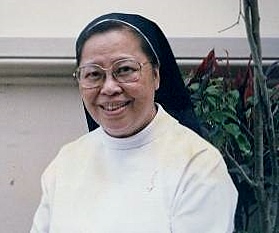
Mary John Mananzan is a Missionary Benedictine sister from the Philippines. A noted theologian and author, she has served as president of St. Scholastica's College, as prioress of the Missionary Benedictine Sisters in the Manila Priory, and as national chairperson of the Association of Major Religious Superiors in the Philippines. She is a political and feminist activist who helped develop an Asian
feminist theology of liberation and works with a number of organizations that deal with gender issues and women's concerns. Currently, she ministers as superior of the Manila community and as a member of the Priory Council.
My congregation has been very environmentally active since the '70s, when we sisters, while protesting a nuclear plant, joined the die-ins with women belonging to militant organizations, lying down on the street in our white habits, with a banner: "Over our dead bodies!"
Our ecological advocacy became a congregation-wide commitment when our general chapter of 1994 declared that care for the Earth is "part of our Benedictine way of life and tradition" and mandated that we study the ecological crisis and its effect on people we served, tracing the links to women and children, poverty, justice and peace, and determine concrete actions to care for the earth.
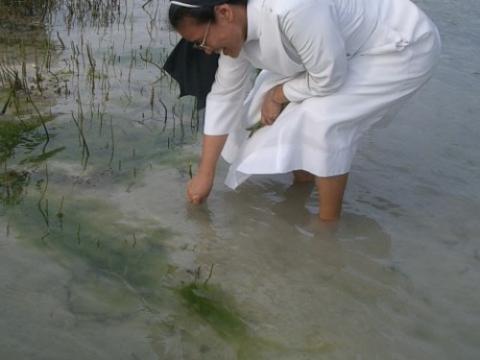
A Missionary Benedictine sister plants mangrove trees in a mangrove rehabilitation project in the Philippines, where the trees can protect coastal areas and also provide habitat for diverse wildlife. (Mary John Mananzan)
The general chapter of 2012 made environmental protection the focus of our apostolate for the next six years. Our Manila Priory took this mandate very seriously. The Peace, Justice and Integrity of Creation Desk personnel went to all 21 houses to give ecological-consciousness seminars to our sisters and their lay partners in schools, hospitals and pastoral apostolates. Most of our houses have acquired a farm where we do organic biodiverse farming and where our students undertake tree planting activities.
We have 10 schools all over the Philippines. In all units of these schools, we incorporate ecological modules, sponsor ecological meetings, encourage our students toward advocacy and activism, launch campus-cleanliness campaigns, adopt ecologically friendly practices like zero-waste management, "reduce, recycle and reuse" practices, and healthy-food campaigns; plant trees, establish environmental committees, and encourage simplicity of lifestyle.
Our building construction follows green principles, which provide for water-collecting systems and solar energy frames. Our sisters are active in their support of environmental struggles, especially against logging and mining. They are in solidarity with indigenous people defending their ancestral lands against multinational mining companies.
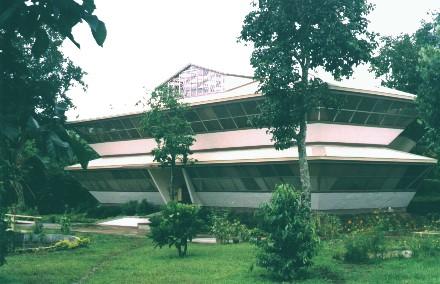
Women and Ecology Wholeness farm offers programs in bio-diverse and organic farming, the use of organic fertilizer and pesticides, and alternative energy sources. It is located in Mendez Cavite, 70 km from Manila in the Philippines. (Mary John Mananzan)
Lately, we supported the Manilakbayan, a walk of 1,000 kilometers by the Lumads, indigenous people of Mindanao, to protest the killing of their leaders and the closing of their schools by the military protecting the multinational mining industries. I featured them in my TV talk show, "Nunsense Makes Sense," and held press conferences for them. We provided their camps with food and water during their three-week stay in Manila.
We took part in the massive environmental campaign on the occasion of the global climate summit in Paris on Nov. 29, 2015, and we do the yearly Walk for the Earth organized by the church.
We walk, we partner with environmental groups, but for us, ecological commitment is not only advocacy, but a way of life, so we conform our personal lives to good ecological practice.

Missionary Benedictine sisters prepare to plant mangrove trees under the direction of Sr. Mary John Mananzan, center left, reading, in a coastal rehabilitation work in the Philippines. (Provided photo)
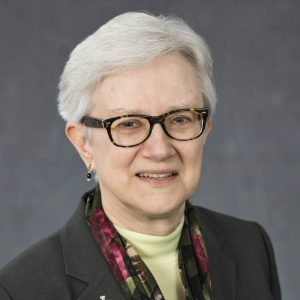
Dawn Nothwehr is a Franciscan Sister of Rochester, Minnesota. She has taught religious studies at several universities in the Midwest and since 1999 has held academic appointments at the Catholic Theological Union in Chicago, where she currently holds an endowed chair in Catholic theological ethics in the Department of Historical and Doctrinal Studies. She is a prolific writer and speaker, publishi
ng in peer-reviewed journals, blogs, book reviews, online posts and media.
Creation care is in the DNA of the charism of the Sisters of St. Francis of Rochester and a passion we have expressed publicly for some 50 years.
In supporting the 2010 resolution of the General Assembly of the United Nations that access to clean water and sanitation is a human right, we educate, advocate and unite with others on this issue.
Beehives became a permanent fixture at our motherhouse in 2000 and provide us with honey and wax. Our vegetable garden, flower beds, prairie grass plots and flowering bushes provide the bees with forage while beautifying the environment and removing carbon dioxide, and we educate people about the many dangers bees face today.
Since the fall of 2013, 600 solar panels have graced our property — the largest solar field in southeastern Minnesota. At peak performance, it generates 150 kilowatts of electricity per day, the amount of energy needed by about 21 homes. A "win-win" electricity source: We reduce the need for fossil fuels, and the rebate we received from Rochester Public Utilities covered one-third of the cost, giving us a payback period of about six years. The system's life expectancy is 30 to 40 years, with little, if any, maintenance, even at temperatures from -40 Fahrenheit degrees to 185 degrees Fahrenheit.
Our solar field is also an occasion for sustainability education through coverage by various media. In today's technocracy, there is precious little land that is not "built up" or contaminated by human waste. So to deepen awareness of and contribute to the physical, mental and spiritual health of all by safeguarding fresh air, water, natural beauty and ecological interaction with animals, plants and trees, in 2019, we chose to set aside 72 acres of our property in a conservation easement that will be protected in perpetuity.
On Jan. 16, 2020, our sisters were publicly recognized [by Rochester Public Utilities] for "short and long range plans and practices for the care and preservation of the land, trees, and water at Assisi Heights based on the mission of the Rochester Franciscans, 'reverence for creation.' The range of their activities includes eradicating buckthorn, eliminating garlic mustard [both non-native invasive species], care for honey bees, restoring trees, planting annuals in the spring to beautify the landscape, developing a butterfly garden as well as strategically caring for the prairie area."
In his "Canticle of the Creatures," St. Francis of Assisi praised God with Brother Sun, Sister Moon, Brother Fire, Sister Water and Our Sister, Mother Earth: "Laudato Si', mi Signore!" This canticle is our moral compass and reverential stance, globally and locally, praising God with creation.

Sister beekeepers and gardeners with some harvest in 2017 (Franciscan Sisters of Rochester, Minnesota)
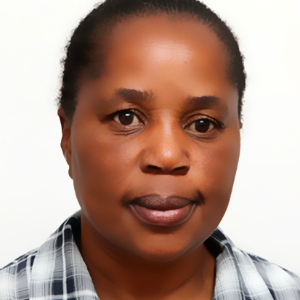 Monica Nyachowe is a Dominican sister from Zimbabwe. She has more than 20 years of experience in teaching and administration of schools at various levels, including as school head of the Dominican Convent School in Harare. Her academic work included early childhood education, educational leadership, management and policy. She moved into university teaching in educational studies and currently teaches at Arrupe Jesuit University in leadership and governance.
Monica Nyachowe is a Dominican sister from Zimbabwe. She has more than 20 years of experience in teaching and administration of schools at various levels, including as school head of the Dominican Convent School in Harare. Her academic work included early childhood education, educational leadership, management and policy. She moved into university teaching in educational studies and currently teaches at Arrupe Jesuit University in leadership and governance.
The world as we know is changing rapidly. We humans are always playing catch-up. My congregation has concretely made efforts in a number of our general and regional chapters to write a statement about care for the Earth in our vision statement. Below is an excerpt from one of our chapter acts:
We live Gospel values faithfully
And take risks,
As we challenge
Abuse of power, materialism and individualism
In ourselves and others.
We make efforts to honour and care for the Earth,
To alleviate poverty,
And to promote all that supports life.
With our desire to honor and care for the Earth, our communities have tried to consciously do something that promotes care for the Earth. Collectively, we have been encouraged to "go green" in our local communities. Most of our communities have a garden to help grow our own organic foods rather than buying everything, especially excluding genetically modified foods. In addition, many sisters who want to eat healthy foods that have not been processed have been changing their diets to include, for example, brown (zviyo) rapoko porridge and brown rice.
In some communities that have a campus or grounds, trees have been planted to absorb the carbon dioxide that contributes to climate change. Most of them are fruit trees, which also contribute to a healthy diet.
To reduce the use of fossil fuels, we have also been asked to ensure that we use solar energy where possible. This is being implemented in a few communities, but mostly in hospitals and our retirement home. Most of our schools also are working to have solar put in place.
One of our schools has sent students into the streets of the city to clean them of all refuse and rubbish on a big scale.
A sister in our community who works in the media field is planning a video program in a slum area of Harare in collaboration with some schools there to instill in these young people the necessity of keeping our planet clean.
Most of us want to care for the Earth and have the commitment to do so, but sometimes, we do things unconsciously and forget to maintain our collective efforts to care for the Earth. But it helps to be in community where there is always someone to remind us.
Advertisement
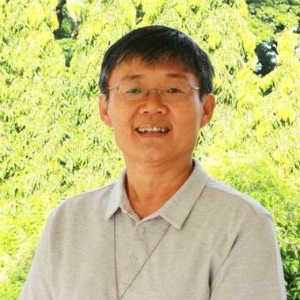 Jantana Wongsankakorn, an Ursuline Sister of Thailand, worked in the financial sector for 10 years. Inspired by the simplicity of religious life, she joined the congregation in Bangkok. After biblical studies in India, Mandarin courses in Taiwan and a tertianship in Rome, she ministered as a catechist and a member of the national chaplain team and then as a missionary in Cambodia. Currently, she is a member of an Asian Pacific chaplain team and teaches mathematics at the Ursuline school in Bangkok. (jwursuline@gmail.com)
Jantana Wongsankakorn, an Ursuline Sister of Thailand, worked in the financial sector for 10 years. Inspired by the simplicity of religious life, she joined the congregation in Bangkok. After biblical studies in India, Mandarin courses in Taiwan and a tertianship in Rome, she ministered as a catechist and a member of the national chaplain team and then as a missionary in Cambodia. Currently, she is a member of an Asian Pacific chaplain team and teaches mathematics at the Ursuline school in Bangkok. (jwursuline@gmail.com)
Sixty years ago, the Ursulines in Thailand bought 5 hectares [about 12 acres] of land 20 miles from the city center of Bangkok to use for education ministry. The land is lower than the surrounding area and floods at least two months every year in the rainy season.
About 35 years later, the Ursulines and Jesuits developed it as a retreat center for youth and city people who seek a place for quiet and solitude and named it "Santiwana," which translates to "peaceful wood."
Two years ago, the center director, Jesuit Fr. Vichai Phoktavi, became ill. Trying to find a way to make the empty center useful, we considered several questions: How does this relate to the needs of the next generation, particularly city people? How should we care for our common home, in the spirit of "Laudato Si': on Care of our Common Home?"
We found a nongovernmental organization, Media Center for Development Foundation, with agricultural expertise, and using our land and their knowledge, we developed the place into an eco-community. The vision of this project is: "Living in harmony with nature in sustainable community with a spirit of love, sharing and sacrifice for our common home." Its mission is to:
- Restore and maintain the integrity of the ecosystem there, including soil, water and biodiversity of plants and trees, small and large animals like birds, insects, butterflies and fish;
- Create habitats and produce food, medicine and clothing by planting rice, vegetables, herbs, fruits, mushrooms; raising ducks, chickens, goats, and fish; and processing and preserving food for consumption and sharing with the needy;
- Use innovative technology that is safe and friendly to people and the environment to produce compost, manure, earthworm fertilizer, charcoal and bioactivated carbon for agriculture, and use wind and solar cells to generate electricity in the community;
- Build a learning center to provide young people with ecological experiences: for example, the use of a solar pump or bicycle pump for watering; building a mud house, straw house, bamboo house, and a house from waste materials such as glass bottles, logs, or recycled paper; and
- Organize educational activities like lectures and workshops, an eco-camp and short courses in organic agriculture, food processing and natural product processing, alternative energy and waste management.
We hope this project will be an instrument of God, helpful to the environment by raising awareness and concern about waste and pollution for city people, especially the young. The Santiwana eco-community was begun last year. Though we have few younger sisters, we are confident that with networking, we can do something for our mother Earth, our common home.

Sr. Winifred Brubach shows a cabbage from the Sisters of Charity of Cincinnati garden. She designs interfaith and intercultural programs for environmental studies teachers and religious, civic and business groups and Earth-related spirituality and theology programs. (Sisters of Charity of Cincinnati)
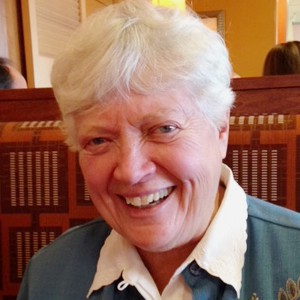 Mary Ann Flannery is a Sister of Charity of Cincinnati, Ohio, who has held teaching and administrative positions at several colleges. Before her community, Vincentian Sisters of Charity, merged with the Sisters of Charity, she served as community president and in other leadership roles. She has been a freelance journalist, the director of a Jesuit retreat house, and active in social justice issues for more than 30 years. She continues to offer retreats and spiritual direction.
Mary Ann Flannery is a Sister of Charity of Cincinnati, Ohio, who has held teaching and administrative positions at several colleges. Before her community, Vincentian Sisters of Charity, merged with the Sisters of Charity, she served as community president and in other leadership roles. She has been a freelance journalist, the director of a Jesuit retreat house, and active in social justice issues for more than 30 years. She continues to offer retreats and spiritual direction.
When the late Sr. Paula Gonzalez, a Sister of Charity of Cincinnati, saw the 1972 picture of our beautiful Earth from space, she closed her biology textbook and began a new career as an advocate for Earth and a pioneer leading religious communities and others to a greater awareness of what needs to be done to save our Earth.
In 1991, she founded Earth Connection on our motherhouse property, remodeling a large empty garage with recycled wood, furniture, carpeting and an entire wall of recycled aluminum cans and installing a photovoltaic solar panel heating system.
Here, facilities coordinator and master gardener Sr. Winifred Brubach provides lectures and workshops, and oversees a large organic garden that could qualify as a mini-farm. (Since 2005, it has supplied an estimated 15,000 pounds of fresh vegetables to struggling families of Price Hill.)
Program Director Sr. Caroljean Willie uses experience gained in representing the Sisters of Charity Federation at the United Nations. She designs interfaith and intercultural programs for environmental studies teachers and religious, civic and business groups and Earth-related spirituality and theology programs. Her global travels showed her how poverty and wealth underlie our treatment of Earth, and she continues to assist developing countries in becoming more ecologically engaged and motivated for a sustainable environment.
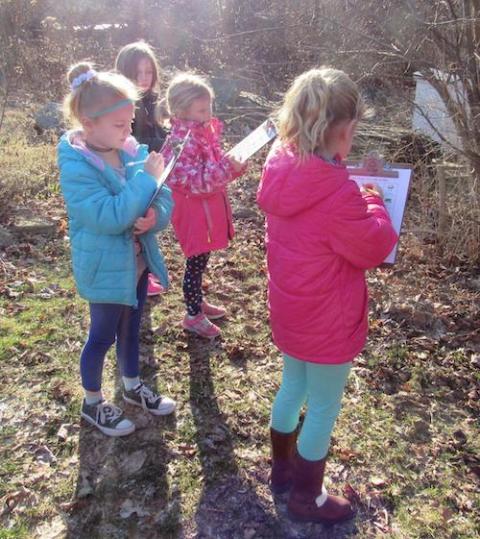
Girls Scouts outside the Sisters of Charity of Cincinnati's Earth Connection center take notes on nature. (Sisters of Charity of Cincinnati)
Not far from Earth Connection, the entrance to the motherhouse property displays 46.5-kilowatt solar panels, which make a difference in Earth's atmosphere and in the utility costs of our large campus, providing electricity for two large apartment houses. In two years' time, this system saved enough electricity to run an electric car 820,913 miles, burn 101.78 barrels of oil and save 16.3 trees.
At the same time, a geothermal heating and cooling system was installed for these homes bringing us to "net zero," meaning they operate at the equivalent of zero energy consumed. For six months of the year, our solar panels generate enough energy to meet our needs and put some back into the grid.
The first line of Earth Connection's mission statement says, "Earth Connection is a center for learning and reflection about living lightly on the Earth." Both Winnie and C.J. remark how much "living lightly" has meant to them in their own lives and how the example of the congregation's commitment to sustainable ecology adds to the public witness — making this a holy enterprise.
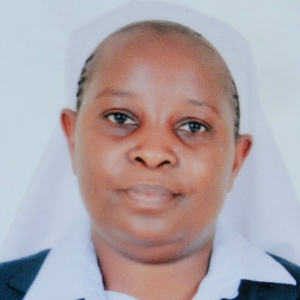 Grace Mary Kenyonga, from Uganda in East Africa, is a member of the Congregation of the Daughters of Our Lady of the Sacred Heart, the region of South Africa. In South Africa, she first ministered to adults and children with HIV/AIDS and taught high school religious education and catechism. For two and a half years, she served in a predominantly Muslim area in Senegal, where she worked in the community's clinic for the most marginalized and vulnerable in society. She has recently been missioned back to South Africa.
Grace Mary Kenyonga, from Uganda in East Africa, is a member of the Congregation of the Daughters of Our Lady of the Sacred Heart, the region of South Africa. In South Africa, she first ministered to adults and children with HIV/AIDS and taught high school religious education and catechism. For two and a half years, she served in a predominantly Muslim area in Senegal, where she worked in the community's clinic for the most marginalized and vulnerable in society. She has recently been missioned back to South Africa.
Global warming and environmental degradation have been a serious concern in many countries. Here in our country, we often worry about the number of animal species that will become extinct because of the destruction of their natural habitat.
The charism of our congregation includes "meeting the needs of the time." In other words, we focus on the specific needs of the area where we are. It may be in the sector of education, health, community empowerment or the like. Since environmental degradation is a worldwide concern, the congregation takes environmental protection as a major concern. Every first Friday of the month, we have a special prayer intention for peace and justice and protection of the environment.
In all our regions worldwide, there is someone responsible for the apostolate of peace, justice and environmental protection. In all our ministries — schools, health facilities, orphanages, pastoral work — we endeavor to sensitize the people we work with about the need to protect the environment. We educate them about the dangers of plastic material to the soil and human health and provide dustbins for disposing of plastics to avoid having them going into the soil. Another area of emphasis is to encourage people to plant more trees and practice organic farming to avoid overuse of pesticides.
As for my own local community, we plant trees in our compound to take carbon dioxide out of the air. All our vegetable gardens are organic, and we do not use pesticides. We try as much as possible not to use plastic bags for shopping and use paper ones instead — it is the environment that is affected in the long run. In situations where it is unavoidable, we keep the plastic bags for future use.
Our communities use water thoughtfully and sparingly. We try to save energy by economizing on power use: for example, any unnecessary lightbulbs are switched off.
All this is done to save resources and energy, taking these small steps to help lower global temperatures and do our part to minimize climate change
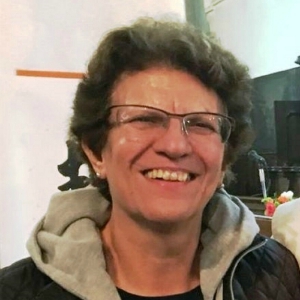 Maria Magdalena Bennasar (Magda) of the Sisters for Christian Community is from Spain. Studies in theology gave her a foundation for the charism of prayer and ministry of the Word with an emphasis on spirituality and Scripture: teaching, conducting retreats and workshops, creating community and training lay leaders in Australia, the U.S. and Spain. Currently, she is working on ecospirituality and searching for a space to create a center or collaborate with others.
Maria Magdalena Bennasar (Magda) of the Sisters for Christian Community is from Spain. Studies in theology gave her a foundation for the charism of prayer and ministry of the Word with an emphasis on spirituality and Scripture: teaching, conducting retreats and workshops, creating community and training lay leaders in Australia, the U.S. and Spain. Currently, she is working on ecospirituality and searching for a space to create a center or collaborate with others.
To be part of Thomas Berry's Ecozoic era requires the intelligence of an alert heart. Let's stop and listen to the heartbeat of the Earth and, if you are able, bow down to the parcel of earth nearest to you and listen to the Earth's story.
It all began millions of years ago, when she was unfolding her beauty in the form of blue oceans and seas, forests and rocks, mountains and green lands, golden deserts and high skies.
Millions of species began to emerge and grow. They helped each other to develop in a chain of mutual support.
Everything was marvelous when on the sixth day (Genesis 1:26), just before reaching perfection, humankind loomed: the conscious ones called to honor the existing blooming of life and be part of the whole.
Like a pandemic virus, we humans exploded. Consciousness was infected by selfishness, and we humans destroyed life.
But in the midst of savage fires, we can discover the ecological refugia: islands of green among the ashes, nests for the seeds of life, a metaphor for consecrated life in the 21st century.

Delicate Arch, Arches National Park, Utah (Pixabay)
The great deconstruction began for many of us years ago when studying and implementing in our houses and lifestyles a total respect for sister Earth by implementing "sustainability principles":
- avoiding depletion of the Earth's natural resources to maintain an ecological balance;
- acting as stewards versus acting as owners;
- renouncing the ownership of buildings after listening to the cry of the Earth and of the poor;
- living simple lifestyles in simple households as a way to radically reduce energy, water, maintenance expenses;
- being self-supportive to understand the cost and value of everything we use, eat, enjoy or break;
- renouncing elitism and the titles and privileged status which keep us from serving the planet and its people instead of using them all for our own benefit.
Education and unbiased information are crucial if we are to be respectful to the planet. Many of us are re-educating ourselves through courses, readings and discussions.
It is up to our consciences how we use our time, talents and abilities to minister to the planet, our agonizing sister without which life stops existing. Either we change, or the planet takes care of it, as we are experiencing with the present pandemic.
Without titles, without meat, without buildings; informed and alert, we lessen our consumerism and become respectful pilgrims on our sacred sister Earth.












